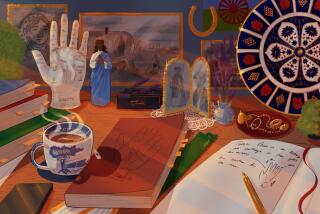Oracles and belief: modern answers to ancient questions
- Share via
You don’t have to believe in oracles to find them interesting. This is the premise of “The Road to Delphi,” Michael Wood’s subtle and wide-ranging consideration of oracles and the oracular mode. In ancient Greece, Delphi was the site of the most famous oracle. Here, it was believed, Apollo, the god of truth and light, spoke through the mouth of an inspired woman known as the pythia, who in turn conveyed the message to a priest, who relayed it to the person who had made the inquiry.
People about to make difficult choices or embark on risky, uncertain enterprises would hasten to the oracle to question it: A king might inquire whether he should make war against an enemy. City fathers might ask who or what was causing a plague. A woman might ask whether she should marry; a man might want to know if he would ever have a son; and a son -- like Oedipus -- might consult an oracle to find out who his biological parents are.
But if belief in oracles was common in ancient times, notes Wood, there was also skepticism, even back in their heyday. The 5th century BC Greek historian Thucydides, Wood notes, “characteristically bundles oracles together with other forms of superstition, the kind of thing people reach for when they are in trouble, but not otherwise.” Yet even in our own time, some 20 centuries after the ancient oracles disappeared, many of us still seek answers from sources we’ve endowed with oracular authority: economists, psychologists, astrologers and other gurus. In Wood’s opinion, even doctors may be seen in this light:
“The doctor represents, to the best of his or her authority, the advice of the god -- the god in this instance being a name for the best medical knowledge of the time. The patient hears the advice, indeed has presented herself or himself at the place where this advice is formally dispensed, and must now decide whether to act on it or not.”
Modern patients -- and ancient Greeks -- might also seek a second opinion, consulting another doctor (or a different oracle) to find a more satisfactory answer to their questions. In both cases, Wood draws our attention to a similar “structure of question and response, of mingled authority and freedom.” Of course, he does not go on to claim equal authority for medical knowledge (which, whatever its limitations and errors, is still based on a body of scientific inquiry) and oracular knowledge (based on mysterious, unverifiable sources). Wood thinks that the atmosphere in which oracles (ancient or modern) function depends on a combination of belief and skepticism (doubt being as vital a component as the faith).
A professor of English at Princeton and author of books on contemporary fiction and film, Wood finds instances of the oracular, or discussions of its nature, in a wide range of sources, including Sophocles, Herodotus, Plutarch, Shakespeare, Milton, Kafka, Thomas Mann, Wittgenstein, Walter Benjamin, Gershom Scholem, William Golding and Philip K. Dick. He also examines films like the Wachowski brothers’ “The Matrix,” Pier Paolo Pasolini’s “Oedipus Rex” and Akira Kurosawa’s “Throne of Blood” and Igor Stravinsky’s opera-oratorio “Oedipus Rex.” What emerges again and again is the overwhelming tendency of human beings to misread oracles or, rather, to hear what we hope for rather than fear.
The central premise or insight that Wood offers involves the perpetual conundrum of free will versus determinism. Presumably, those who consult the oracle believe that the oracle knows the future. Indeed, as Wood shows, the oracle, being divinely inspired, is presumed to know everything: future, past and present. Yet the inquirer also believes he has a choice to make. And the answers the oracle gives -- and the ways in which the inquirer may interpret or misinterpret them -- are part of this area of choice.
Wood has come not to bury oracles -- nor, really, to praise them. Some of the crispest and most refreshing parts of this book are about the great debunkers of oracles, most notably poet John Milton and the 17th century French essayist Bernard Le Bovier Fontenelle. But Wood’s portrayal of the ubiquity of the oracles, sacred and secular, sheds light on a noteworthy aspect of human nature and demonstrates that it is a more complex mode than we might have guessed.





